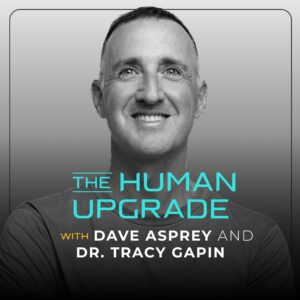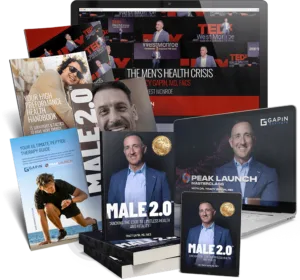
Hippocrates said, “Let food be thy medicine and medicine be thy food.” In other words, eat for your body type.
Do you have trouble losing weight?
Are your blood tests consistently coming back with high cholesterol, adrenal concerns, low testosterone, and other risk factors?
Do you have an increased risk of disease?
Are you currently suffering from an illness?
All of these concerns may be a result of an incorrect or poor diet or failing to eat for your body type.
What you eat has a direct impact on your genetic expression, which proportionally influences your health and wellness.
This intimate relationship between nutrition and epigenetics has a direct result on your body’s health, energy, and immunity.
Healthy, nutrient-rich foods strengthen your DNA expression to minimize illness, pains, and risk of disease. In reverse, the wrong foods can activate DNA markers that make you susceptible to obesity, cardiovascular disease, cancer, and other ailments.
Food is so much more than calories and energy. The vitamins and nutrients you put in your body have a direct impact on your health at a molecular and genetic level.
Let’s take a quick look at what epigenetics is and how it’s related to your diet. Then I’ll give you a list of the best foods you should eat for your body type to activate strong genes and deactivate harmful ones.
What is epigenetics?

Epigenetics is the means of “controlling” your genes. Your DNA pattern will always remain the same. The DNA you were born with will be the DNA structure you die with.
Though your genes don’t change, the expression of those genes can alter over time. For example, you could have blonde hair as a child and now you naturally have brown hair. Your gene didn’t change, but the expression of that hair color gene changed.
This change in genetic expression occurs through activation or deactivation of epigenetic factors. “Epigenetics” looks at those processes that “turn off” or “turn on” certain genes.
Read: What Is Epigenetics & Why Do You Care?
The two most common types of activators are DNA methylation and histone acetylation.
DNA methylation occurs when methyl molecules attach to the end of genetic sequences to tighten or loosen the DNA’s double helix. This process plays a significant role in aging, cancer, and other inflammatory diseases. Methylation has been especially linked to cancer production by silencing those genes that repair cells and fight against tumors.
Histone acetylation occurs when acetyl enzymes alter the body’s histone proteins. This has been shown to control the repression of certain chromatin domains in the DNA process.
Both DNA methylation and histone acetylation impact the way your genes are expressed. If an environmental or lifestyle trigger causes either process, your genes can be silenced or activated.
Just as easily as high-risk genes can be flipped “on,” they can be reversed into the “off” position as well.
The easiest way to reverse or prevent the process of negative genetic expression is with healthy lifestyle influencers—like nutrition and diet.
How are epigenetics and diet linked?
DNA methylation and histone acetylation occur as a result of certain lifestyle and environmental triggers. These triggers can include physical exercise, stress, sleep, addiction, pollution, and diet.
Every day, our body handles oxidative stress. Oxidative stress occurs naturally whenever we metabolize oxygen in our bodies. When we exercise, move, or even breathe, we metabolize oxygen to create more energy. This is a natural, low-impact oxidative stress.
Oxidative stress also occurs from our environment, like pollution, radiation, pesticides, and chemicals. It can also be a result of high stress or lack of sleep.
Although we deal with oxidative stress daily, high stress can create a serious health problem. This stress, also called “uncontrolled free-radical production,” alters your genetic expression. It minimizes the body’s immunity and damages your body’s natural self-healing properties.

This leads to disease and cancer because the body doesn’t have the immune strength to prevent or fight against illness. Oxidative stress also promotes inflammation, which progresses conditions like cancer, premature aging, and heart disease.
We can’t prevent our bodies from dealing with oxidative stress. However, we can minimize the impact of oxidative stress on our genes and health—through a healthy diet and by ensuring you eat for your body type.
Eating certain vitamins and nutrients actually helps defend against oxidative stress in the body. In fact, diet is the number one way to fight against cancer and disease caused by oxidative stress.
What are phytonutrients?
Certain nutrients and compounds, like phytonutrients, are proven defense mechanisms against free radicals. These nutrients promote the gene expression of protective immunity genes while silencing those genes that initiate high-risk disease.
Phytonutrients are plant-based compounds that impact our bodies at the genetic level. They’re antioxidants, meaning that they fight against (“anti”) oxidative stress (“oxidants”). They’re also anti-inflammatory, meaning they defend against inflammatory triggers. These phytonutrients have healing qualities that are proven to activate healthy genes while silencing adverse ones.

There are nearly 25,000 known phytonutrients. Each plant has its own makeup of phytonutrients, which are usually found in the pigment of the plant. For example, red plants like tomatoes and watermelon contain lycopene, while yellow plants like pineapple and lemon contain flavonoids. Both lycopene and flavonoids are phytonutrients, but they impact genetic expression in unique ways.
Thus, you want to have a “rainbow diet.” A variety of plant colors helps ensure you get an array of phytonutrients in your system. For optimal body function, you need a diversity of nutrients and vitamins.
What should I eat for healthy genes?
You want to incorporate more phytonutrients into your diet in order to eat for your body type and activate immune-boosting genes and deactivate disease-risk ones. This is a process that everyone should add to eat right for his/her body type.
But what specific phytonutrients should you eat for ultimate gene health?
Below I’ll go through some of the most impactful phytonutrients that will boost your overall health—and your sexual health.
Ultimately, though, you want to focus on choosing healthy, whole foods that come in a variety of colors. Whether on this list or not, most fruits and veggies contain nutrients that can assist your body’s healthy genetic expression.
-
Lycopene
Phytonutrient: lycopene
Foods: tomatoes, watermelon, red cabbage, grapefruit, papaya

Lycopene is a type of carotenoid that gives a reddish color to fruit. It’s a powerful antioxidant that may help decrease the risk of chronic diseases and cancers.
Some researchers have looked at a link between lycopene and prostate cancer prevention and treatment. The general consensus is that lycopene may have an impact on prostate cancer due to its strong antioxidant effect. Lycopene is found in high concentrations in prostate cells, so it may be the fastest acting antioxidant due to proximity. Lycopene has also been linked to slower tumor growth and reduced levels of an insulin growth factor.
The lycopene antioxidant is especially related to the deactivation of “aging” genes. Basically, lycopene may help minimize the natural effects of aging!
-
Beta-carotene
Phytonutrient: beta-carotene
Foods: carrots, mangos, oranges, sweet potato, winter squash, cantaloupe, spinach, lettuce

Beta-carotene (BC) is most often found in orange fruits and vegetables. It may be proangiogenic, meaning it promotes angiogenesis. Angiogenesis is the creation of new blood vessels from pre-existing blood vessels. One study found that BC decreased DNA methylation and promoted vascular endothelial growth.
Strong blood vessels are critical to a healthy body. Your blood vessels transport oxygen throughout your body, delivering energy to your muscles and organs. Without a strong process of angiogenesis, you’re at a higher risk of cardiovascular disease. This vascular process also plays an important role in erectile dysfunction, which is often the result of weak blood vessels or other vascular disorders.
-
Flavonoids
Phytonutrient: flavonoids
Foods: lemons, citrus, pineapple, berries, apples, legumes, red wine

Flavonoids are linked to anti-inflammatory, anti-diabetic, anti-cancer, and anti-thrombogenic mechanisms. They seem to be able to module cell-signaling cascades.
Flavonoids are associated with a significantly reduced risk of stroke and cardiovascular events. This is likely because of their anti-inflammatory effects on markers of oxidative stress.
Learn more about flavonoids here.
-
Glucosinolate
Phytonutrient: glucosinolate
Foods: kale, arugula, watercress

Glucosinolate is a phytonutrient that suppresses cancer cell growth. These cruciferous vegetables tend to be bitter due to the high levels of glucosinolate. For years, this bitter taste was associated with plant “toxins.” In fact, the reverse has been proven true. That bitterness actually plays an important role in genetic biosynthetic pathways.
Cruciferous vegetables also contain isothiocyanates, which increase histone acetylation and activate immune-boosting genes.
Want to get the most out of your vegetables? Cut your cruciferous veggies and let them sit for five to ten minutes before cooking. This helps activate the glucosinolate enzyme to release the nutrients for digestion and absorption.
-
Anthocyanins
Phytonutrient: anthocyanins
Foods: pomegranates, blueberries, plums, raspberry, black rice, corn

Anthocyanins are one of the greatest phytonutrient powerhouses. In fact, the flavonoid anthocyanin plays a significant role in minimizing free radicals, decreasing inflammation, minimizing blood sugar concentrations, and preventing age-related neural declines. There are endless proven benefits of anthocyanins that your DNA expression loves.
This compound gives foods a reddish-purple pigment, so be on the lookout for dark-colored fruits like pomegranates and blueberries.
In fact, pomegranates are proven to be one of the best foods for your sexual and overall health!
-
Quercetin
Phytonutrient: quercetin
Foods: apples, peppers, blueberries, tomatoes, cruciferous vegetables, leafy greens, cocoa, red onion, black and green tea

Quercetin is a strong antioxidant and anti-inflammatory compound. It’s a type of polyphenolic antioxidant that reduces oxidative stress and free-radical genetic changes. Quercetin has been shown to fight inflammatory conditions like high cholesterol, heart disease, ulcers, diabetes, allergies, cognitive impairment, prostate inflammation (BPH), cancer, and skin disorders.
This anti-inflammatory effect helps activate a strong expression of your immune genes.
Apples are especially chock full of quercetin and other necessary phytonutrients. If you learn only one thing from this article, let it be this: An apple a day keeps the healthy genes at play!
-
Butyrate
Phytonutrient: butyrate
Foods: sauerkraut, kimchi, yogurt, pickled beets

Butyrate blocks inflammation in the body, especially in the digestive system. It plays an important role in the fermentation of dietary fibers in the gut. This gut-brain link is critical to overall health—as well as genetic health. If you have a strong gut, you are less likely to be susceptible to adverse DNA methylation.
Learn more about butyrate and probiotic microbiome health here.
Have you noticed that some of the strongest phytonutrients reduce both oxidative stress and inflammation?
Find out more about the concerns of chronic inflammation and its impact on genetic expression.
What should you avoid?
All of the above phytonutrients come from fruits and vegetables.
But does this mean to eat for your body type, you have to avoid all non-plant products?
Not necessarily. You can still eat animal products in moderation. Animal products themselves have not yet been linked to epigenetic methylation concerns. However, animal products and packaged, processed foods do have higher levels of chemicals and additives. These antibiotics and preservatives are proven environmental triggers for epigenetic changes.
Moreover, certain foods drastically impact your health at a genetic and cellular level. Take a look at our list of 7 foods that cause erectile dysfunction as an example.
You don’t need to drastically change your diet and lifestyle in order to be healthy.
But you need a diverse diet to maintain genetic health. Eating the same foods day after day make it challenging for your genes to function properly. You need a variety of nutrients and vitamins to maintain all processes in the body, including those that regulate gene expression.

Remember: when you eat for your body type by eating a salad, you won’t instantly change your genes. But healthy, strong choices on a consistent basis can impact your weight, energy, and genetic expression. With the right vitamins, you can reduce your risk of disease—while having the most energy you’ve ever had in your life!
Bottom Line
Your health is in your hands—and on your plate! It's imperative for your wellness to eat for your body type. The food you eat has a direct impact on your genetic expression and risk for disease.
Do you know how to incorporate a variety of phytonutrients into your diet?
Do you know how to minimize oxidative stress and control your genetic expression?
No? Then you need an easy, step-by-step plan to get you on the path to ULTIMATE health.
Schedule a consultation to learn how to personalized health advice so you can live your life to the fullest.
Ready to take the next steps?
Schedule a Call
**************************
 In Male 2.0™, Dr. Tracy Gapin has turned everything we once thought we knew about men’s health and performance upside down. The old model of how to be “a man” is broken. A man who works himself to death. Unfortunately, a man who tries to NOT get sick but isn’t really healthy either. And a man who takes a pill for every ill but is never really cured. That was Male 1.0. Now, imagine being THE MAN ─ owning your performance in the bedroom, the weight room, and the boardroom. Living a fully optimized life. Becoming limitless. This is Male 2.0!
In Male 2.0™, Dr. Tracy Gapin has turned everything we once thought we knew about men’s health and performance upside down. The old model of how to be “a man” is broken. A man who works himself to death. Unfortunately, a man who tries to NOT get sick but isn’t really healthy either. And a man who takes a pill for every ill but is never really cured. That was Male 1.0. Now, imagine being THE MAN ─ owning your performance in the bedroom, the weight room, and the boardroom. Living a fully optimized life. Becoming limitless. This is Male 2.0!
Tracy Gapin, MD, FACS is a board-certified Urologist, world renowned Men’s Health & Performance Expert, Author, and Professional Speaker. Using state-of-the-art biometric monitoring, nutrition and lifestyle intervention, Dr. Gapin coaches Fortune 500 executives and evolutionary leaders of business, sports medicine, and high performance. He specializes in cutting-edge precision medicine with an emphasis on epigenetics, providing men with a personalized path to optimizing health & performance. www.GapinInstitute.com
Want more tips to optimize your health? Listen to the latest podcasts. Click HERE








